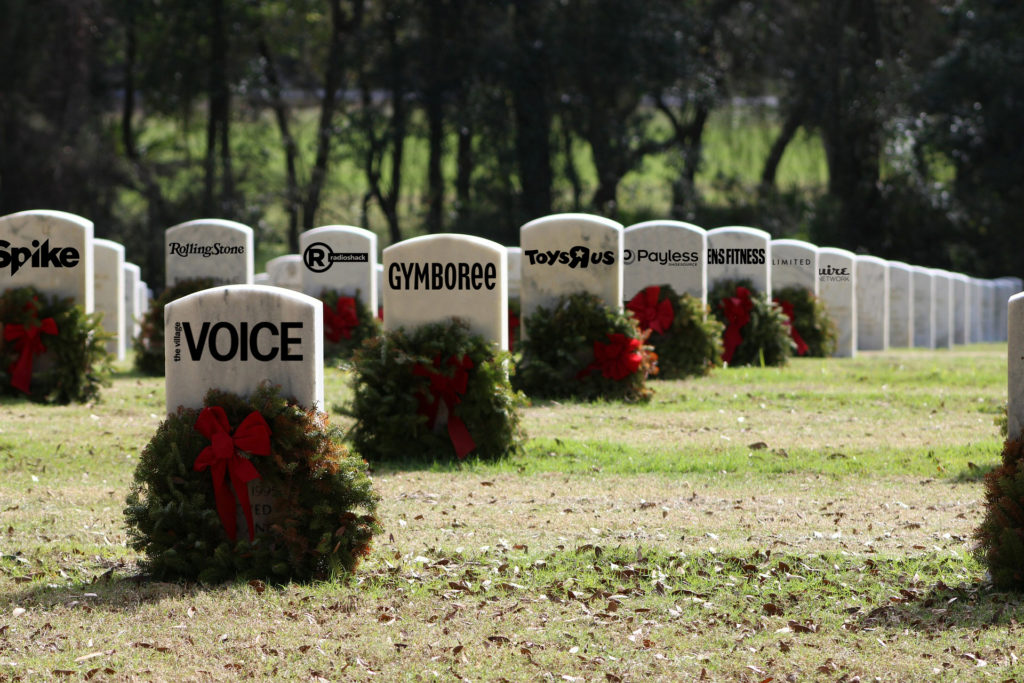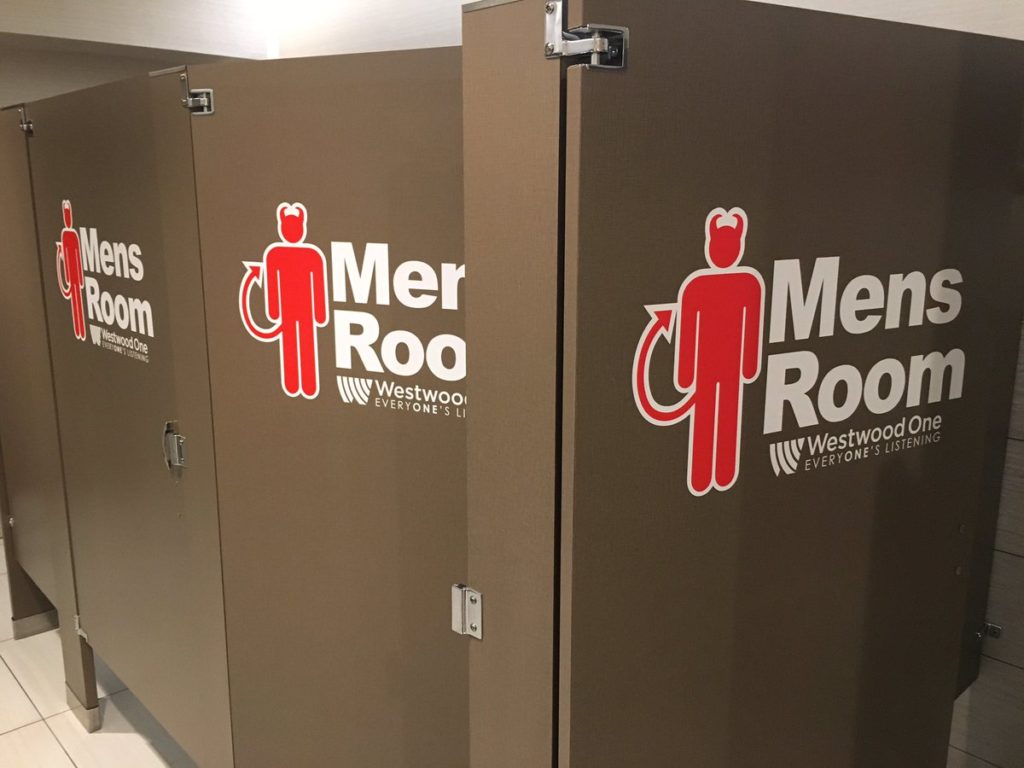 2017 was an especially cruel year for brands that compete against digital juggernauts like Amazon and Netflix, both of whom have reinvented their respective ecosystems. From retailers like Toys R Us and Payless Shoes to print publications like the venerable Village Voice and Rolling Stone, it’s been a bumpy ride for some many legacy businesses, impacted and upended by digital game-changers.
2017 was an especially cruel year for brands that compete against digital juggernauts like Amazon and Netflix, both of whom have reinvented their respective ecosystems. From retailers like Toys R Us and Payless Shoes to print publications like the venerable Village Voice and Rolling Stone, it’s been a bumpy ride for some many legacy businesses, impacted and upended by digital game-changers.
The end of the year is littered with lists – best movies, biggest new stories, Trump’s tweets. But it shouldn’t have been lost on anyone who believes in capitalism that Darwin’s Theory was working overtime in 2017. And as a result, there are scores of big name fails, collapses, and debacles at the hands of the digital tsunami that knows no mercy.
The media world has been especially roiled by the explosion of choice. And you can see it manifest itself in the wake in newspapers and magazines that raised the white flag last year. While The New York Times and Washington Post have thrived as a result of the “Trump Bump,” chances are good the newspaper in your hometown is struggling to stay in business.
Similarly, the television industry – from the broadcast networks to local affiliates in market after market – have been rocked by the non-stop shift to on-demand, punctuated by the influx of new platforms like Netflix. Now, the cable TV industry is feeling the pressure of brands like Sling and YouTube TV that allow consumers to opt for smaller and customizable “skinny bundles,” rather than having to pay for hundreds of channels. While companies like Comcast and AT&T used to have the consumer over the barrel, the reverse is now true. When the average TV viewer watches an average of less than 20 channels per week, the financial wisdom of pay TV subscribership seems crazy. Even cable’s so-called firewall – ESPN – is now feeling the pain, laying off hundreds of people last year.
And then there’s radio.
As veterans, insiders, and observers know, two of radio’s biggest companies have been fighting creditors and banks for years now. Cumulus’ bankruptcy filing late last year was no surprise, while iHeart continues to wrestle with its debt demons.
But overall, the broadcast radio business is fighting the good fight. A number of commercial radio broadcasters experienced growth years, while the public radio and Christian radio sectors continue to thrive, serving their unique audiences well. Many broadcasters have been invigorated by digital technology, as several new ventures and initiatives sprung up in 2017, from podcasting to digital agencies to mobile. While on-demand viewing has devastated over the air television, podcasting – while impactful – has not revolutionized the audio space – yet. And while TV struggles to keep pace with its viewers and their penchant for watching what they want, when then want, radio broadcasters have every opportunity to participate in the on-demand trend, as podcasting tries to work through its growing pains ranging from consumer access to reliable analytics.
Despite the explosion of screens, audio is experiencing a renaissance or even a revolution. As those of us in radio know so well, audio accompanies so many other activities – commuting, exercising, and in many cases, working – it allows consumers to multitask while being entertained and informed.
Radio will most certainly be challenged and tested in the new year, as new technologies and gadgets hit the scene. But the medium has shown strength and resilience, even during times when every competitor from Pandora to Spotify to Slacker to SiriusXM are all trying to out-radio radio.
So, as we head into a new year with new goals and new challenges, I’m resolving to adjust my mindset and my priorities in an effort to reinforce radio’s still solid position. I won’t call tem resolutions because we know what happens to most of those – by mid-month. I’m thinking this list is comprised of things we should be doing anyway, but the start of a new year provides a great opportunity to take inventory.
And conveniently, it’s a list of 12 items designed to keep your station , your company, and perhaps the radio broadcasting business whistling past the graveyard of failed businesses.
1. Build great brands

Many marketers believe consumers are less brand loyal than ever before. But a look at the Apple Store, NFL Football, Disney Theme Parks, and other entertainment brands reveals consistently great crowds that show up year after year. And a look at the rankers in most radio markets reveals pretty much the same thing. Month in and month out, quarter in and quarter out, and year in and year out, many of the same brands almost always occupy the top spots. Investing in legacy radio stations – whether it’s WTOP, Z100, KROQ, or WMMR – is always money well spent.
That translates to marketing, research, staff, infrastructure – all areas that keep the best healthy and strong. But it also means hard work and a true brand focus. A great brand won’t save you from bad decision making, ownership changes, staff defections, or competitive attacks, but it can bolster you against unfortunate events, providing brands with the capital, trust, and time to regroup and come back from adversity.
And I can tell you as someone who’s been involved in more than a few of these, there’s no greater pleasure than helping build a great brand that endures long after your time in the building. That’s the true test of your effectiveness as a manager, programmer, seller, or talent.
2. Play to your strengths
Even the best brands lose focus. And these days, the price of straying from your lane and losing sight of what got you to the dance has never been greater. There are always distractions and they come at stations from all sides – inventory management, music focus, competitive invasions, and overall execution. That’s what great ops managers and group PDs are paid to notice. The great GMs, GSMs, and PDs must keep their collective eye on the prize and keep the organization’s eye on the ball.
What are you famous for? What can you build around? Where are areas where you can grow your audience and your sales? Staying focused has never been more important in a world of bright, shiny objects.
3. Carve out that digital strategy
The “Digital Revolution” is well into its third phase, and yet so many stations – and entire radio companies – struggle to define their positioning in the space. 2018 is the year to devote time, bandwidth, and energy to hacking out their digital schematic. Whether it’s streaming initiatives, podcasting, mobile, video, social media, all of the above, or something else, developing a true digital strategy is of the utmost importance in order to whistle past the above pictured brands in the business cemetery. And communicating that strategy – your digital presence, focus, and priorities – to the company’s rank and file is essential if brands wish to avoid the fate of Radio Shack and Rolling Stone.
If you cannot summon up the resources and staff to do it internally, seek outside help to realistically assess your assets and opportunities. As well as your vulnerabilities. What can your brand handle, where do you already have success, and how can you integrate your legacy assets with the potential of new media to survive and thrive?
4. Strive to do better
One of the lessons of the digital age in which we live is the knowledge that “cruise control” is not a strategy. There may have been a time when “stay the course” or “don’t rock the boat” were viable philosophies. But today, radio brands need to progress, get better, and grow. Every station has rating and revenue goals, but giving the audience more reasons to listen and advertisers more impetus to market with your station as a partner is where broadcasters should keep their sights.
5. Think BIG
Winning is not just about being Syracuse’s #1 Country station or the top biller in Missoula. It’s about being a brand that matters in the community you serve. It could emanate from your personality presence, event marketing, hometown involvement, or simply reflecting the local zeitgeist. A focus on being bigger, more prominent, and a force in your market or your region is what separates the biggest and best stations from the rest of the pack. And it gets you past being dependent on diary and meter placement in order to maintain long-term success.
6. Reach across the aisle
In politics as in life, we accomplish more when we gain cooperation and consensus from different sides. That used to mean programming and sales working together (although that’s always a  good idea). Today, it’s about broadcasters working together – not constantly cannibalizing one another – to elevate radio with a Capital R. I’ve watched broadcasters put down their swords during the past year through our involvement with the NAB, and the net effect is a positive one.
good idea). Today, it’s about broadcasters working together – not constantly cannibalizing one another – to elevate radio with a Capital R. I’ve watched broadcasters put down their swords during the past year through our involvement with the NAB, and the net effect is a positive one.
A wonderful analogy is the auto industry. Similar to radio, each manufacturer worked hard to develop their own proprietary dashboard ecosystem – only to have Apple and Google swoop in with their own standardized platforms. Today, CarPlay and Android Auto threaten to usurp the presence, branding, and even data collection of the major car companies. That’s what happens when industries fail to speak in one voice.
7. What you do matters
Those of us who have been around this business a while have seen it again and again – sometimes, the least likely person in the organization can make a difference that better the franchise. Seth Godin calls these people “linchpins” – go-getters who refuse to fail, and who help make stations and their companies winners.
And the beauty of radio operations is that they’re mostly small and agile, so anyone can become that person who makes the difference, whether they’re in programming, sales, production, engineering, digital, or even on the street team. Communicating to your entire staff that great effort, grit, and guts can impact the entire operation is often the beginning of empowering everyone to aim high.
8. Break new ground
Back in the ’70s, ’80s, and even the ’90s, radio was the steadiest of media. Radio frequencies were escalating in value, and were commonly known as “licenses to print money.” Not so much anymore. Yes, radio assets are valuable, especially when they achieve some level of scale – nationally, regionally, or even in a single market. But being on the air and running commercials are no longer enough.
It is about innovation – coming up with that next idea, initiative, or concept that lights up the organization. And maybe even filters up to the rest of the company. Innovation has become something of a buzz word, but it’s the lifeblood of the biggest and best organizations. If you think the “…or die” part of the equation is a bit much, take a walk through the pictured graveyard.
Next week, I’ll be running around with 180,000 of my best friends at CES, joined by more than 20 prescient broadcast executives, in search of innovation, trends, and ideas. This is how we grow.
9. Look beyond your traditional competition
Radio programmers, managers, and even owners have spent so much time, energy, and money trying to compete against the guy across the street that it sucks up their entire focus and raison  d’être. Radio often gets so caught up in that spy vs. spy competitive vortex it loses track of the bigger war going on around us.
d’être. Radio often gets so caught up in that spy vs. spy competitive vortex it loses track of the bigger war going on around us.
Redefining the competition for consumer attention and advertiser dollars is all part of gaining a better understanding of where your brand truly is positioned in 2018. This month would be a good time to get that giant notepad out to start your own S.W.O.T. analysis – your strengths, weaknesses, opportunities, and threats in the big new world of media brands and platforms.
And it might start with a better understanding of what your audience is doing when they’re not listening to you. It’s not to late to register for Techsurvey 2018, the easiest, least expensive, and most expeditious way of getting those answers. Info is here.
10.Show up
One of the assets your radio station has that Apple, Facebook, Spotify, and other mega-brands don’t have is your local presence. But none of it matters if you aren’t there. These days, street teams are usually so busy fulfilling sales commitments there’s no time or energy remaining to map out a true strategy for being everywhere your listeners are. Get the van painted, rewrapped, and cleaned up, and as the weather improves over these next several weeks, determine how you can use your available resources to be in the right places at the right times. Similarly, on the sales side, having a presence in local agencies, merchant associations, and other market groups can help your brand stand head and shoulders above the pack.
Woody Allen has famously said, “80% of success is showing up.” True that.
11. Find a way to market
Now, I know many of you reading this are rolling your eyes. After all, who really has a marketing budget in 2018? But I’m not talking about producing an expensive TV spot and buying thousands of gross rating points this quarter in order to ensure your brand’s visibility. But owning something – those trash bins at the beach, Facebook ads, video content marketing – can put the spotlight on your brand without breaking the budget.
your brand’s visibility. But owning something – those trash bins at the beach, Facebook ads, video content marketing – can put the spotlight on your brand without breaking the budget.
At last year’s Radio Show in Austin, Westwood One corralled perhaps the most attention-getting space with no competitive noise at the entire convention to market their Mens Room show – yes, the men’s room. Getting attention isn’t always a matter of spending the most money. In fact, oftentimes, it’s about coming up with the most creative platform for your brand.
12. Pay attention to your culture
There are many ways to build big footprints and achieve “scale” – whether it’s in an individual radio market or across an entire broadcasting company. But you  can’t buy a culture. That’s something that is developed, nurtured, and earned. Some very big companies have fallen flat – despite purchasing all the right assets.
can’t buy a culture. That’s something that is developed, nurtured, and earned. Some very big companies have fallen flat – despite purchasing all the right assets.
That’s because their internal vibe simply may not have exuded the right stuff that attracts and energizes great people, and keeps them. No one ever went to work for Merrill Lynch or Allstate Insurance to have a great time. Most dentists and CPAs didn’t get in it for the fun. But in radio – whether it makes sense or not – most of us enlisted in this industry to have an enjoyable career where we could impact others and make a living.
Today, I see it on the faces of students at institutions as diverse as Michigan State, Specs Howard School of Media Arts, and Plymouth Salem High School. You can feel it at Conclave, at Morning Show Boot Camp, and at Dan Vallie’s great National Radio Talent Institutes. Young people want into media careers to have fun, make a difference, and make their mark. Providing an environment that nurtures that potential is the responsibility on all of us.
It’s not about a pool table in the pit or free snacks in the kitchen. It’s not about the jock lounge. It is about carving out a culture where employees feel valued as they work toward a common mission. It’s about creating a workplace where team members feel a sense of purpose and feel they’re making a difference.
13. Say something positive
Yes, it’s a “baker’s dozen,” so I’ve come up with a #13. It’s important in the new year to stay positive – not unrealistically so – but to look for the bright spots for radio. Because there are many. When you hear people badmouthing the business – inside the station, at the family barbeque, or in newspaper stories, push back. Radio has a long list of accomplishments and assets, but as an industry, we have simply assumed that everyone knows our story. They don’t, unless you tell it.
The old saw – “You’re either part of the problem or part of the solution” – may have a louder ring of truth today than ever before. If you’re working in radio, find a way to make it better. It’s that simple. I’ve done my best to give you an ambitious starter list for 2018.
And if you’re discouraged, angry, beaten down, or otherwise out of gas, that’s OK, too. Summon up the strength and conviction to improve your station or your company, or move onto to something you love and rekindles your spirit. There’s no shame in that.
So, while not resolutions, perhaps this list of a dozen+ to-do’s will get you thinking, meeting, and even activating in the new year.
I want to hear some whistling this year as your station, your company – and yes, radio – celebrates another year of success and good fortune.
Let’s make it a happy new year.
- How AI Can Give Radio Personalities More…PERSONALITY - April 23, 2025
- Can Radio Afford To Miss The Short Videos Boat? - April 22, 2025
- Media And Technology In 2025: Believe It Or Not! - April 18, 2025




What a bright, fantastic read to kick off the new year!
Radio STILL has so much going for it. To paraphrase the old, great line, “rumors of its death have been greatly exaggerated”!
If radio can focus and build on its strengths–what makes it so special and unique–while rising to the very real challenges it faces, I anticipate much whistling in 2018!
Thank you, Fred!
David, spot on. Appreciate the kind comments and you reading our blog. Best wishes for a great ’18.
Talk about hitting the ground running…excellent from1-13…Thanks – and Happy New Year
Appreciate that, Tom. Best to you, Vicky, and your fine staff in the new year.
A brilliantly written piece Fred… sharing with my team.
Appreciate it, Terry. Thanks for reading the blog.
Fantastic piece Fred..the perfect way to kick off the new year for our team. Thank you! 🙂
DP
Thanks for those kind words, Dave – from a guy who knows how to create that great culture.
Fred–Great piece, shared not only with all our staff but I forwarded it to the President of the University where I serve on the Board of Trustees … you could substitute “Higher Ed” for “Radio” in the title line easily–and every one of your superb points is applicable in that disrupted industry as well! Thanks for good reading every day … this was particularly succinct!
Peggy, I truly appreciate those comments and the connection to education. Disruption is rampant in the world of business. Glad it resonated for you.
Fred
Well said. I’m with you, lets get everyone whistling this tune.
Thanks for all you do.
Dan
Thanks for all YOU do, Dan. Thanks for the comment.
EXCELLENT read and powerful reminders:) Marc Kaye passed this along and I especially loved your line: ‘It’s about being a brand that matters in the community you serve.’ When I mentor or meet with those interested in becoming a radio talent (including at one of Dan Vallie’s National Radio Talent Institutes) I express the importance to become ‘a personality with community purpose.’ While our personal social media platforms are important, do get out and ‘in front’ of people. As talent we are a big part of the emotional connection the audience makes with radio and our brands, on and off the air.
Thanks Fred!
Shellie Hart
WARM 106.9 (Midday Personality) Hubbard-Seattle
Shellie, many thanks for the kind comment. Your thoughts are spot-on, and typify the importance of hi-touch in a hi-tech world. Please send my best to Marc.
The phrase “whistle past the graveyard” is an idiomatic expression that means to act bravely or confidently in a situation where one is actually afraid or anxious. In the context of radio, here are a dozen ways it can metaphorically “whistle past the graveyard,” signifying how radio can thrive or succeed despite challenges or changes in the media landscape